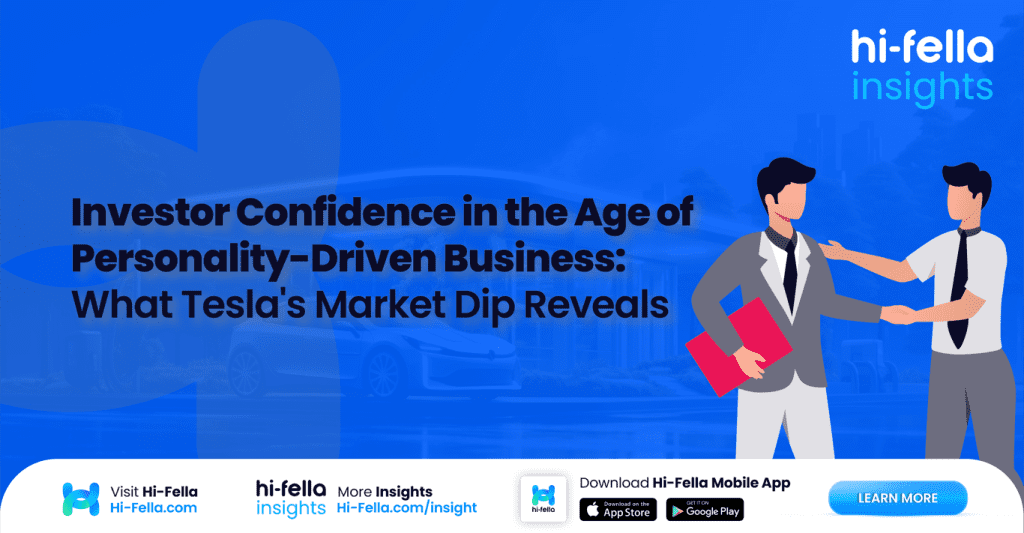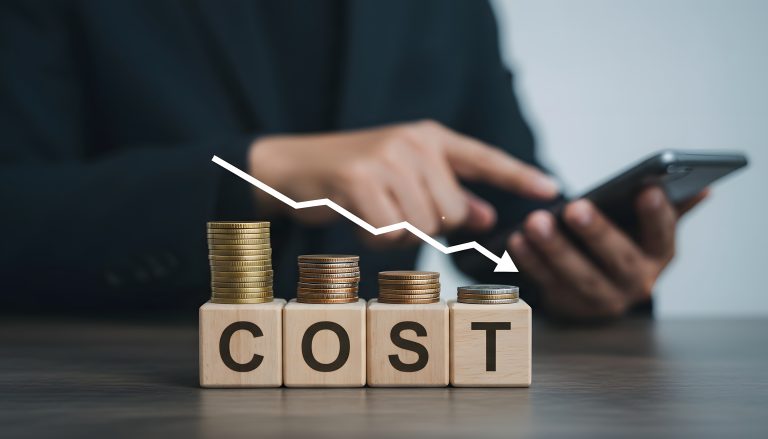In today’s capital markets, financial performance is no longer the sole driver of investor confidence. Increasingly, the perception of leadership—from boardroom behavior to 280-character posts—can make or break market momentum. The recent turbulence in Tesla’s market dip stock isn’t just about cars or earnings—it’s a window into the emerging dynamic between CEO reputation and market resilience.
Enter Hi-Fella. In a world where investor sentiment can shift as quickly as a founder’s headline, platforms that prioritize business fundamentals and long-term connections are more essential than ever. Hi-Fella empowers global traders, manufacturers, and investors to operate confidently—grounded in real value, not volatility.
The Rise of the Founder-Driven Stock Market Affect Investor Confidence
Public companies were once valued purely on performance—profit margins, cash flow, market share. But in the digital age, founders have become brand avatars, and their personal narratives now directly influence investor decisions.
Consider:
Elon Musk
Elon Musk’s ventures—Tesla, SpaceX, and X (formerly Twitter)—are tightly interwoven with his personal identity. His business decisions, media appearances, and personal statements often become headlines that directly impact the performance and public perception of his companies. Musk’s presence on social media and his reputation as a visionary entrepreneur heavily influence investor confidence and stock value, making him an integral part of Tesla and SpaceX’s brand image.
His persona and the way he communicates with the public, particularly through Twitter, has also led to market fluctuations. This influence goes beyond traditional business strategies; it shapes the narrative around his companies, leading investors to weigh Musk’s public statements as a signal for future growth or decline. Thus, Musk has become one of the clearest examples of a “founder-driven stock market,” where the founder’s identity is inseparable from the financial outlook of their companies.
Jeff Bezos
Jeff Bezos, the founder of Amazon, represents another powerful example of the founder-driven stock market. Bezos’ shift from Amazon’s CEO role had immediate consequences for market confidence. As he handed over the reins to Andy Jassy, investors scrutinized not only Amazon’s operational future but also its organizational tone and leadership style. Bezos’ personal brand was intertwined with Amazon’s rise, and his exit from the CEO role signaled potential shifts in the company’s future growth and innovation trajectory.
The influence of Bezos extended beyond his role as the CEO; it became clear that his personal style of leadership, which emphasized long-term vision, innovation, and risk-taking, had permeated Amazon’s culture. This leadership shift thus carried considerable weight in how investors assessed Amazon’s future prospects. His influence remained visible even after his departure, with many investors still looking to him for cues about the company’s long-term direction.
Sam Altman
Sam Altman’s ousting and subsequent reinstatement as CEO of OpenAI highlighted the growing importance of leadership continuity, particularly in high-stakes fields like artificial intelligence. OpenAI’s rapid development and Altman’s role in its strategic direction became a focal point for both investors and industry experts. His leadership changes sparked broader conversations about the stability of leadership in AI and how that could impact innovation and corporate direction.
The volatility surrounding Altman’s leadership also underscored the emerging influence of “key person visibility” in markets. Investors are now considering the potential risks associated with leadership transitions, especially in tech sectors where innovation and decision-making are closely tied to individual executives. Altman’s situation illustrates how leadership in cutting-edge industries like AI has become a critical factor in risk assessment and long-term investment strategies.
Investor behavior now mirrors not just financials, but executive behavior, values, and even tweets. According to a 2024 survey by PwC, nearly 64% of institutional investors factor leadership credibility into risk assessments more heavily than five years ago.
This rise in “founder premium” or “key person visibility” means markets are more responsive—but also more fragile.
Tesla’s Market Dip — A Signal or a Side Effect?
Tesla’s recent stock dip—marked by a 6–10% decline over several trading sessions—wasn’t solely linked to delivery numbers or margin pressures. Much of the volatility followed:
- Elon Musk’s controversial political engagements on social media
- Investor backlash during the annual shareholder meeting
- Reports of executive departures and internal disagreements on autonomy direction
While fundamentals remained strong in many respects, analyst downgrades from firms like Morgan Stanley and Wedbush cited reputational and governance concerns.
Key indicators:
- Unusual trading volumes spiked within 48 hours of Musk’s polarizing posts
- Retail investor sentiment, tracked via platforms like StockTwits and Reddit, turned negative
- VIX correlation, often used to measure implied market fear, rose during this period for high-growth tech
For many observers, this wasn’t about Tesla’s battery pipeline. It was about trust, tone, and long-term focus.
Risk Management in Personality-Heavy Portfolios
Institutional investors are taking note. When companies are led by strong personalities, “Key Person Risk” becomes part of the investment calculus. This risk refers to the potential for a business’s valuation to decline due to the departure, misconduct, or reputational damage of a central figure.
Common mitigation strategies include:
- Sentiment analysis tools (e.g., Thinknum, Quiver Quant) to track real-time shifts in public and investor sentiment
- Portfolio hedging, using put options or ETFs to buffer against swings tied to executive activity
- Governance filters during due diligence to assess succession plans, board independence, and leadership checks
Asset managers are increasingly incorporating leadership volatility into pricing models—especially in high-tech, founder-led companies.
What This Means for Global Markets and Private Enterprises
While much of the focus remains on U.S. public markets, this founder-effect has global implications.
Emerging-market startups aiming to go public face mounting pressure to establish governance frameworks that can withstand personal disruption. International investors evaluating U.S. or EU tech firms often view CEO-driven risk as a barrier to stability, especially in ESG-conscious markets.
Implications include:
Valuation Adjustments for Companies Overly Reliant on One Individual
Startups, especially those in emerging markets, that are overly dependent on a single individual or charismatic founder can face significant valuation adjustments when evaluated by investors. These companies are at risk of being perceived as unstable, particularly if their success is tied closely to one individual’s leadership. If that person leaves or faces disruption, the company might experience a rapid decline in market value, as their survival and growth may seem uncertain without the driving force of the founder.
Investors, particularly those from ESG-conscious regions like Europe or parts of Asia, often view this risk as a barrier to long-term stability. Therefore, such companies need to develop robust governance frameworks that can continue to thrive independently of any one leader. This is a way to mitigate the potential negative impact on the company’s valuation and ensure sustained confidence from global investors.
Lower ESG Scores if Personality Behavior Contradicts Stated Values
Environmental, Social, and Governance (ESG) scores have become an increasingly important metric for investors, especially those in public and private sectors who are highly conscious of sustainable and ethical practices. If a company’s founder or CEO’s personality and public behavior contradict the values it publicly espouses, the company’s ESG score may suffer. Charismatic founders can often become the face of the company, and if their personal actions are not in line with the company’s stated goals, this discrepancy can significantly harm the company’s reputation.
For instance, if a founder is involved in controversial behavior or makes public statements that do not align with the company’s environmental or social values, it could lead to a reassessment of the company’s commitment to ESG principles. Such misalignment risks the company’s relationship with key stakeholders and can directly affect investor confidence and the firm’s overall financial performance.
IPO Caution Among Global LPs and Sovereign Funds in Founder-Led Volatile Environments
Investor caution is often heightened when it comes to companies led by strong personalities in volatile markets, especially as these businesses approach an Initial Public Offering (IPO). Global Limited Partners (LPs) and sovereign funds are particularly wary of investing in founder-led companies where there may be concerns regarding leadership stability, especially when the founder’s role is central to the firm’s identity and operation. The more volatile the market, the higher the perceived risk for investors.
This caution translates into a greater level of scrutiny on these companies as they prepare for an IPO. Potential investors are concerned about the impact of leadership disruptions on stock performance and overall business sustainability. Companies aiming for IPOs need to provide a clear succession plan and demonstrate strong governance structures to reassure investors that the company can withstand challenges without excessive reliance on a single leader.
The Shift from Charisma to Reliability
In the current business climate, it’s becoming increasingly clear that reliability matters more than charisma. While charismatic leaders may have once been seen as key to driving a company’s success, investors are now more focused on the long-term stability and dependability of a business. Platforms that emphasize consistent, relationship-based trading—such as Hi-Fella—are gaining strategic importance because they provide more stable foundations for business partnerships and investments.
This shift reflects a broader trend toward valuing steady and reliable leadership, especially in an environment where ESG principles are prioritized, and companies need to demonstrate that their operations and leadership styles align with their stated values. Founders who are able to show maturity and a consistent, reliable approach to leadership will likely be more successful in securing investment and building trust among stakeholders.
Private companies with charismatic founders must now prepare more rigorously for investor scrutiny—not just on metrics, but on leadership maturity, tone, and public behavior.
In this climate, reliability matters more than charisma—and platforms that emphasize consistent, relationship-based trade (like Hi-Fella) gain strategic importance.
Join Hi-Fella Today!
Markets may rise and fall with personalities, but global trade depends on more stable foundations. In industries where capital follows perception, and perception follows personalities, companies need networks they can trust.
Hi-Fella offers just that.
As a trusted sourcing and trade platform, Hi-Fella helps businesses:
- Connect with vetted suppliers and buyers across 40+ countries
- Build resilient partnerships that go beyond social media trends
- Navigate uncertainty with tools focused on consistency, not volatility
- Operate in an ecosystem grounded in trust, documentation, and performance
Whether you’re in tech, logistics, or manufacturing, Hi-Fella empowers you to grow your business through stable, global connections—independent of personality-driven disruptions.
Join Hi-Fella today to trade with confidence, invest with clarity, and build beyond the headlines.








